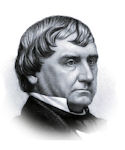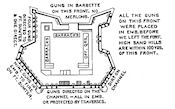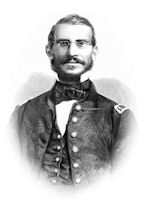WAR DEPARTMENT,
Washington, February 6, 1861.
Hon. I. W. HAYNE,
Attorney-General of the State of South Carolina:
SIR: The President of the United States has received your letter of the 31st ultimo,¹ and has charged me with the duty of replying thereto. In the communication addressed to the President by Governor Pickens, under date of the 12th of January,¹ and which accompanies yours, now before me, his excellency says:
![]()
I have determined to send to you Hon. I. W. Hayne, the attorney-general of the State of South Carolina, and have instructed him to demand the surrender of Fort Sumter, in the harbor of Charleston, to the constituted authorities of the State of South Carolina. The demand I have made of Major Anderson, and which I now make of you, is suggested because of my earnest desire to avoid bloodshed, which a persistence in your attempt to retain the possession of that fort will cause, and which will be unavailing to secure to you that possession, but induce a calamity most deeply to be deplored.
The character of the demand thus authorized to be made appears–under the influence, I presume, of the correspondence with the Senators to which you refer–to have been modified by subsequent instructions of his excellency, dated the 26th, and received by yourself on the 30th of January, in which he says:
![]()
If it be so that Fort Sumter is held as property, then as property, the rights, whatever they may be, of the United States can be ascertained; and for the satisfaction of these rights the pledge of the State of South Carolina you are authorized to give.
The full scope and precise purport of your instructions, as thus modified, you have expressed in the following words:
![]()
I do not come as a military man to demand the surrender of a fortress, but as the legal officer of the State–its attorney-general–to claim for the State the exercise of its undoubted right of eminent domain, and to pledge the State to make good all injury to the rights of property which arise from the exercise of the claim.
And lest this explicit language should not sufficiently define your position, you add:
The proposition now is that her (South Carolina’s) law officer should, under authority of the governor and his council, distinctly pledge the faith of South Carolina to make such compensation in regard to Fort Sumter and its appurtenances and contents, to the full extent of the money value of the property of the United States delivered over to the authorities of South Carolina by your command.
You then adopt his excellency’s train of thought upon the subject so far as to suggest that the possession of Fort Sumter by the United States, “if continued long enough, must lead to collision,” and that “an attack upon it would scarcely improve it as property, whatever the result, and if captured it would no longer be the subject of account.”
The proposal, then, now presented to the President is simply an offer on the part of South Carolina to buy Fort Sumter and contents as property of the United States, sustained by a declaration in effect that if she is not permitted to make the purchase she will seize the fort by force of arms. As the initiation of a negotiation for the transfer of property between friendly governments this proposal impresses the President as having assumed a most unusual form. He has, however, investigated the claim on which it professes to be based, apart from the declaration that accompanies it; and it may be here remarked that much stress has been laid upon the employment of the words “property” and “public property” by the President in his several messages. These are the most comprehensive terms which can be used in such a connection, and surely, when referring to a fort or any other public establishment, they embraced the entire and undivided interest of the Government therein.
The title of the United States to Fort Sumter is complete and incontestible. Were its interest in this property purely proprietary, in the ordinary acceptation of the term, it might, probably, be subjected to the exercise of the right of eminent domain; but it has also political relations to it, of a much higher and more imposing character than those of mere proprietorship. It has absolute jurisdiction over the fort and the soil on which it stands. This jurisdiction consists in the authority to “exercise exclusive legislation” over the property referred to, and is therefore clearly incompatible with the claim of eminent domain now insisted upon by South Carolina. This authority was not derived from any questionable revolutionary source, but from the peaceful cession of South Carolina herself, acting through her legislature, under a provision of the Constitution of the United States. South Carolina can no more assert the right of eminent domain over Fort Sumter than Maryland can assert it over the District of Columbia. The political and proprietary rights of the United States in either case rest upon precisely the same grounds.
The President is, however, relieved from the necessity of further pursuing this inquiry by the fact that, whatever may be the claim of South Carolina to this fort, he has no constitutional power to cede or surrender it. The property of the United States has been acquired by force of public law, and can only be disposed of under the same solemn sanctions. The President, as the head of the executive branch of the Government only, can no more sell and transfer Fort Sumter to South Carolina than he can sell and convey the Capitol of the United States to Maryland, or to any other State or individual seeking to possess it. His excellency the governor is too familiar with the Constitution of the United States, and with the limitations upon the powers of the Chief Magistrate of the Government it has established, not to appreciate at once the soundness of this legal proposition.
The question of re-enforcing Fort Sumter is so fully disposed of in my letter to Senator Slidell and others, under date of the 22d of January–a copy of which accompanies this–that its discussion will not now be renewed. I then said: “At the present moment it is not deemed necessary to re-enforce Major Anderson, because he makes no such request. Should his safety, however, require re-enforcements, every effort will be made to supply them.” I can add nothing to the explicitness of this language, which still applies to the existing status. The right to send forward re-enforcements when, in the judgment of the President, the safety of the garrison requires them rests on the same unquestionable foundation as the right to occupy the fortress itself.
In the letter of Senator Davis and others to yourself, under date of the 15th ultimo, they say: “We, therefore, think it especially due from South Carolina to our States, to say nothing of other slaveholding States, that she should, as far as she can consistently with her honor, avoid initiating hostilities between her and the United States or any other power”; and you now yourself give to the President the gratifying assurance that” South Carolina has every disposition to preserve the public peace “; and, since he is himself sincerely animated by the same desire, it would seem that this common and patriotic object must be of certain attainment.
It is difficult, however, to reconcile with this assurance the declaration on your part that “it is a consideration of her (South Carolina’s) own dignity as a sovereign, and the safety of her people, which prompts her to demand that this property should not longer be used as a military post by a Government she no longer acknowledges,” and the thought you so constantly present, that this occupation must lead to a collision of arms, and the prevalence of civil war.
Fort Sumter is in itself a military post, and nothing else; and it would seem that not so much the fact as the purpose of its use should give to it a hostile or friendly character. This fortress is now held by the Government of the United States for the same objects for which it has been held from the completion of its construction. These are national and defensive, and were a public enemy now to attempt the capture of Charleston, or the destruction of the commerce of its harbor, the whole force of the batteries of this fortress would be at once exerted for their protection. How the presence of a small garrison, actuated by such a spirit as this, can compromise the dignity or honor of South Carolina, or become a source of irritation to her people, the President is at a loss to understand. The attitude of that garrison, as has been often declared, is neither menacing, nor defiant, nor unfriendly. It is acting under orders to stand strictly on the defensive, and the government and people of South Carolina must well know that they can never receive aught but shelter from its guns, unless, in the absence of all provocation, they should assault it, and seek its destruction. The intent with which this fortress is held by the President is truthfully stated by Senator Davis and others in their letter to yourself of the 15th of January, in which they say, “It is not held with any hostile or unfriendly purpose towards your State, but merely as property of the United States, which the President deems it his duty to protect and preserve.”
If the announcement, so repeatedly made, of the President’s pacific purposes in continuing the occupation of Fort Sumter until the question shall have been settled by competent authority has failed to impress the government of South Carolina, the forbearing conduct of his administration for the last few months should be received as conclusive evidence of his sincerity; and if this forbearance, in view of the circumstances which have so severely tried it, be not accepted as a satisfactory pledge of the peaceful policy of this administration towards South Carolina, then it may be safely affirmed that neither language nor conduct can possibly furnish one. If, with all the multiplied proofs which exist of the President’s anxiety for peace and of the earnestness with which he has pursued it, the authorities of that State shall assault Fort Sumter and peril the lives of the handful of brave and loyal men shut up within its walls, and thus plunge our common country into the horrors of civil war, then upon them, and those they represent, must rest the responsibility.
Very respectfully, your obedient servant,
J. HOLT,
Secretary of War.
![]()
______
¹ Not of record in War Department
![]()












